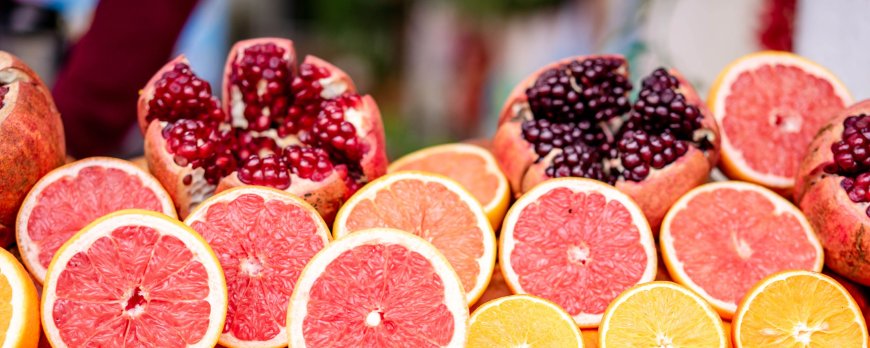What is the best vitamin for tiredness and fatigue?
Uncover the answer to 'What is the best vitamin for tiredness and fatigue?' Find holistic solutions to boost your energy and overcome fatigue here.

What is the best vitamin for tiredness and fatigue?
Tiredness and fatigue can have a significant impact on our daily lives, but incorporating the right vitamins into our diet can help combat these energy-draining symptoms. Vitamins play a crucial role in boosting energy levels and fighting fatigue. By understanding which vitamins are most effective, we can make informed choices that promote overall well-being and vitality.
Key Takeaways:
- Vitamin B complex, including vitamins B1, B2, B3, B5, and B6, are essential for energy production and can be found in various food sources.
- Vitamin C helps regulate energy metabolism and is abundant in citrus fruits and bell peppers.
- Vitamin D is crucial for a healthy immune system and can be obtained from sunlight exposure and certain foods.
- Magnesium plays a vital role in energy production and is found in dark leafy greens, whole grains, and nuts.
- Iron is necessary for oxygen transportation and can be found in foods like beef, chicken, and spinach.
- Vitamin B12 is involved in red blood cell production and can be obtained from animal products and fortified nutritional yeast.
- Ashwagandha and cordyceps are herbal supplements known for their potential to combat fatigue and improve energy levels.

Vitamins for Increased Energy Levels
When it comes to boosting energy levels and overcoming fatigue, certain vitamins have proven to be particularly effective. Incorporating these energy-boosting vitamins into your diet can help you feel more alert and revitalized. Here are some key vitamins to consider:
- Vitamin B1 (Thiamine): This essential vitamin plays a crucial role in converting carbohydrates into energy. Foods rich in vitamin B1 include pork, fish, nuts, and seeds.
- Vitamin B2 (Riboflavin): Known for its importance in energy production within the heart and muscles, vitamin B2 can be obtained from eggs, meat, and dairy products.
- Vitamin B3 (Niacin): Essential for generating energy, vitamin B3 is found in foods like tuna, chicken, and sweet potatoes.
- Vitamin B5 (Pantothenic Acid): Involved in converting food into energy, vitamin B5 can be found in mushrooms, salmon, and lentils.
In addition to the B vitamins, there are other key energy-boosting vitamins that can make a significant difference:
- Vitamin B6: Crucial for converting food into energy and accessing stored energy, this vitamin can be found in bananas, sunflower seeds, and spinach.
- Vitamin C: Aside from its role in supporting the immune system, vitamin C also helps regulate energy metabolism. Citrus fruits, strawberries, and bell peppers are excellent sources of this vitamin.
- Vitamin D: Essential for a healthy immune system, vitamin D can be obtained from sunlight, fish, and fortified foods like milk and cereal.
The Role of Minerals in Boosting Energy
In addition to vitamins, several minerals are known for their energy-boosting properties:
- Magnesium: This mineral plays a vital role in energy production and can be found in dark leafy greens, whole grains, and nuts.
- Iron: Essential for the transportation of oxygen in the blood, iron-rich foods such as beef, chicken, and spinach can help combat fatigue.
It is worth noting that while a balanced diet can provide many of these essential vitamins and minerals, some individuals may require supplementation. Consulting with a healthcare professional can help determine if supplements are necessary to address specific deficiencies and combat tiredness and fatigue effectively.
Vitamin B complex for energy production
The B vitamins, collectively known as the vitamin B complex, are essential for energy production and can be powerful allies in the battle against tiredness and fatigue. These water-soluble vitamins play a crucial role in converting food into energy, helping the body function optimally.
Here are some key B vitamins and their role in energy production:
- Vitamin B1 (thiamine): Thiamine is involved in converting carbohydrates into energy. Good dietary sources of thiamine include pork, fish, nuts, and seeds.
- Vitamin B2 (riboflavin): Riboflavin is important for energy production in the heart and muscles. It can be obtained from eggs, meat, and dairy products.
- Vitamin B3 (niacin): Niacin is necessary for making energy and is found in foods like tuna, chicken, and sweet potatoes.
- Vitamin B5 (pantothenic acid): Pantothenic acid is involved in converting food into energy. It can be found in mushrooms, salmon, and lentils.
- Vitamin B6: Vitamin B6 is crucial for turning food into energy and accessing stored energy. Good sources of vitamin B6 include bananas, sunflower seeds, and spinach.
By ensuring an adequate intake of these B vitamins, individuals can support their energy production and potentially alleviate tiredness and fatigue.

Vitamin C for Energy Metabolism Regulation
Beyond its well-known immune-boosting properties, vitamin C also plays a vital role in energy regulation and can help address low energy levels. This essential vitamin acts as a cofactor in the synthesis of carnitine, a molecule that helps transport fatty acids into the mitochondria, where they are converted into energy. By supporting this process, vitamin C aids in the production of adenosine triphosphate (ATP), the body's main energy currency.
In addition to its role in energy metabolism, vitamin C also acts as a potent antioxidant, protecting cells from oxidative stress. This is particularly important as the production of ATP generates free radicals, which can damage cells and contribute to fatigue.
The Benefits of Vitamin C:
- Regulates energy metabolism
- Assists in ATP production
- Acts as an antioxidant to combat fatigue
- Aids in the transport of fatty acids for energy production
To ensure an adequate intake of vitamin C, incorporate foods rich in this vitamin into your diet. Citrus fruits, such as oranges and grapefruits, are excellent sources of vitamin C. Other fruits, like strawberries and kiwis, also provide a substantial amount. Vegetables like bell peppers and broccoli are great options as well. Additionally, supplementation may be considered for individuals with low vitamin C levels or those who have difficulty meeting their daily requirements through diet alone.
Remember, maintaining optimal energy levels involves a comprehensive approach that includes a balanced diet, regular exercise, quality sleep, and stress management. Vitamin C, along with other essential vitamins and minerals, can play a valuable role in supporting your energy levels and combating fatigue. Consult with a healthcare professional to determine the best vitamin regimen for your individual needs.
Vitamin D for a Healthy Immune System
Vitamin D, often referred to as the sunshine vitamin, is not only crucial for bone health but also plays a key role in supporting a healthy immune system and combating fatigue. This essential vitamin is naturally produced in our bodies when our skin is exposed to sunlight. However, many people may struggle to get adequate vitamin D levels, especially during the winter months or if they live in areas with limited sunlight.
Adequate levels of vitamin D are important for overall well-being and can help boost your immune system, which is vital for fighting off infections and keeping you healthy. Studies have shown that vitamin D deficiency is associated with an increased risk of respiratory infections, including the common cold and flu. By maintaining optimal vitamin D levels, you can support your body's natural defenses and reduce the chances of falling prey to fatigue-inducing illnesses.
In addition to sunlight, you can also obtain vitamin D from certain foods such as fatty fish like salmon, mackerel, and sardines. Fortified dairy products, orange juice, and cereals are also good sources. If you suspect you have a vitamin D deficiency, it is advisable to consult with a healthcare professional who can assess your levels and recommend appropriate supplements if necessary.
To ensure you're getting enough vitamin D, aim for daily exposure to sunlight (around 10 to 30 minutes) and include foods rich in this vitamin in your diet. However, it's important to note that excessive sun exposure can increase the risk of skin cancer, so it's crucial to strike a balance and protect your skin from harmful UV rays.
Magnesium for Energy Production
Magnesium, an essential mineral, is often overlooked but is fundamental for energy production, making it an important nutrient to consider when combating fatigue. This vital mineral plays a crucial role in over 300 biochemical reactions in the body, including the production and utilization of adenosine triphosphate (ATP), the body's main source of energy.
One of the key ways magnesium supports energy production is by helping convert the food we eat into ATP. Without sufficient magnesium, the enzymes that facilitate this process cannot function optimally, leading to decreased energy levels. Additionally, magnesium is involved in muscle function and relaxation, which can help alleviate muscle fatigue and improve overall energy levels.
Benefits of Magnesium:
- Enhances energy production by converting food into ATP
- Supports muscle function and relaxation
- Helps alleviate muscle fatigue
- Regulates the sleep-wake cycle, promoting restful sleep
- May improve exercise performance and endurance
To ensure adequate magnesium intake, incorporate magnesium-rich foods into your diet. Dark leafy greens like spinach and kale, whole grains like brown rice and quinoa, and nuts such as almonds and cashews are excellent sources of magnesium. You can also consider taking magnesium supplements, particularly if your diet is lacking in magnesium-rich foods or if you have specific medical conditions that may impair magnesium absorption.
In conclusion, when combating fatigue, it's important not to overlook the role of magnesium in energy production. Incorporating magnesium-rich foods into your diet or taking magnesium supplements can help support optimal energy levels and combat feelings of tiredness and fatigue.
Iron for Oxygen Transportation
Iron, a vital mineral, is crucial for the transportation of oxygen in our bloodstream and can have a significant impact on our energy levels and overall vitality. Without adequate iron levels, our bodies struggle to deliver oxygen to our tissues and organs, leading to fatigue and general feelings of tiredness. Ensuring sufficient iron intake is therefore essential for combating tiredness and improving energy levels.
There are several food sources rich in iron that can help replenish our iron stores and boost our energy. Including foods such as beef, chicken, spinach, and legumes in our diet can provide us with the iron necessary for optimal oxygen transportation.
To maximize iron absorption, it's important to consume foods rich in vitamin C alongside iron-rich foods. Vitamin C enhances the body's ability to absorb iron from plant-based sources, such as spinach and legumes. Including vitamin C-rich foods like citrus fruits, strawberries, and bell peppers can help optimize iron absorption and improve energy levels.
In addition to dietary sources, iron supplements may be recommended for individuals with iron deficiency or those experiencing chronic fatigue. However, it's important to consult a healthcare professional before starting any supplement regimen.

Vitamin B12 for Red Blood Cell Production
Vitamin B12 is an essential nutrient that plays a crucial role in the production of red blood cells, making it an important vitamin to consider when addressing chronic fatigue. Red blood cells are responsible for carrying oxygen throughout the body, providing energy to cells and tissues. A deficiency in vitamin B12 can lead to anemia, which can cause symptoms like fatigue, weakness, and shortness of breath.
To support red blood cell production and combat fatigue, it is important to ensure an adequate intake of vitamin B12. Good dietary sources of vitamin B12 include animal products such as meat, fish, dairy, and eggs. Vegans and vegetarians can obtain vitamin B12 from fortified nutritional yeast or supplements.
In addition to its role in red blood cell production, vitamin B12 also helps maintain healthy nerve cells and supports cognitive function. It is involved in the synthesis of DNA and the metabolism of fatty acids and amino acids. These processes are essential for overall energy production and vitality.
If you struggle with chronic fatigue or suspect a vitamin B12 deficiency, it is important to consult with a healthcare professional. They can assess your symptoms, perform tests if necessary, and recommend appropriate supplementation or dietary changes to address your specific needs.
Herbal supplements for fatigue
In addition to vitamins, there are herbal supplements that have been traditionally used to alleviate fatigue and boost energy levels. These natural remedies can provide an alternative approach to combat tiredness and enhance overall wellbeing. Here are some herbal supplements that are known to have potential benefits in fighting fatigue:
Ashwagandha
Ashwagandha, also known as Indian ginseng, is an adaptogenic herb that has been used in Ayurvedic medicine for centuries. It is believed to help the body adapt to stress, reduce fatigue, and increase energy levels. Ashwagandha is known for its calming properties, which can help improve mental and physical stamina. This herb can be taken in supplement form or consumed as a powder mixed with warm milk or water.
Cordyceps
Cordyceps is a type of fungus that grows on caterpillar larvae in the high-altitude regions of Tibet and China. It has long been used in traditional Chinese medicine as a natural energizer. Cordyceps is believed to enhance oxygen utilization, improve endurance, and boost energy levels. This herbal supplement is available in various forms, including capsules, extracts, and powders.
It is important to note that while herbal supplements can be beneficial in combating fatigue, it is always recommended to consult with a healthcare professional before adding them to your routine. They may interact with certain medications or have contraindications for certain health conditions. Additionally, it is crucial to ensure the quality and purity of the supplements you choose, as not all products on the market may be equally effective or safe.
Holistic Lifestyle Approach to Combat Fatigue
While vitamins and supplements play a crucial role in combating tiredness and fatigue, adopting a holistic approach to our overall lifestyle is equally important. By making simple but impactful changes to our daily routine, we can enhance our energy levels and fight off fatigue naturally. Here are some holistic strategies to consider:
- Get enough sleep: Prioritize quality sleep by establishing a regular sleep schedule and creating a relaxing bedtime routine. Aim for seven to eight hours of uninterrupted sleep each night to allow your body to repair and recharge.
- Stay physically active: Regular exercise is vital for boosting energy levels and combating fatigue. Engage in activities you enjoy, such as brisk walking, cycling, or yoga, to improve circulation and increase oxygen flow throughout your body.
- Manage stress: Chronic stress can contribute to feelings of fatigue. Implement stress management techniques like meditation, deep breathing exercises, or engaging in hobbies that bring you joy and relaxation.
- Stay hydrated: Dehydration can lead to fatigue, so it's important to drink plenty of water throughout the day. Carry a reusable water bottle with you to stay hydrated and replenish lost fluids.
- Eat a balanced diet: Nourish your body with a variety of nutrient-rich foods. Focus on consuming whole grains, lean proteins, fruits, vegetables, and healthy fats. Avoid excessive consumption of processed foods, sugary snacks, and drinks as they can cause energy crashes.
Additional Tips:
- Limit caffeine intake: While a cup of coffee can provide a temporary energy boost, excessive caffeine consumption can disrupt sleep patterns and contribute to fatigue. Moderation is key.
- Practice relaxation techniques: Deep breathing exercises, progressive muscle relaxation, and mindfulness meditation can help reduce stress levels and promote relaxation, leading to improved energy levels.
- Ensure adequate sunlight exposure: Spending time outdoors and soaking in natural sunlight can help regulate your body's internal clock and boost vitamin D levels, which are essential for energy production and a healthy immune system.
- Seek social support: Surround yourself with positive, supportive individuals who uplift and motivate you. Engage in activities with loved ones, as social connections can provide emotional well-being and energy.
By implementing these holistic lifestyle changes, you can go beyond relying solely on vitamins and supplements to combat tiredness and fatigue. Take a comprehensive approach to your well-being, and you'll reap the benefits of improved energy levels and overall vitality.
Conclusion
In conclusion, while there isn't a single best vitamin for tiredness and fatigue, a combination of various vitamins can help combat fatigue and boost energy levels when incorporated into a balanced and healthy lifestyle. The B complex, which includes vitamins B1, B2, B3, B5, and B6, plays a crucial role in energy production and can be found in foods like pork, fish, nuts, and seeds. Vitamin C, found in citrus fruits, strawberries, and bell peppers, helps regulate energy metabolism. Vitamin D, obtained from sunlight, fish, and fortified foods, is essential for a healthy immune system. Magnesium, found in dark leafy greens, whole grains, and nuts, contributes to energy production. Iron, found in foods like beef, chicken, and spinach, is necessary for the transportation of oxygen in the blood. Lastly, vitamin B12, obtained from animal products and fortified nutritional yeast, is involved in the production of red blood cells.
In addition to these vitamins, herbal supplements like ashwagandha and cordyceps have shown potential in combating fatigue and improving energy levels. However, it is important to note that proper sleep, exercise, stress management, and a balanced diet are equally important in fighting tiredness and fatigue. Incorporating these strategies into a holistic lifestyle approach can further enhance the benefits of vitamins and supplements.
Overall, it is recommended to consult with a healthcare professional before starting any new vitamin regimen or herbal supplement. They can provide personalized advice based on individual needs and ensure safe and effective usage. By combining the right vitamins, adopting a healthy lifestyle, and seeking professional guidance, individuals can take proactive steps towards combating tiredness and fatigue, and improve their overall energy levels.

































































































































